
És un joc (un quiz) per treballar les emocions. Esta pensat per fer-se durant les hores de tutoria de 1r d'ESO.
- Subject:
- Psychology
- Social Science
- Material Type:
- Game
- Author:
- Cati Marquet
- Date Added:
- 06/01/2023

És un joc (un quiz) per treballar les emocions. Esta pensat per fer-se durant les hores de tutoria de 1r d'ESO.
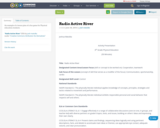
An example of a lesson plan of a fun game for Physical education students.
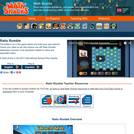
The battle is on in this game where you build your own potions! Check your ratios to win this mixture mix-off. Ratio Rumble guides students in: identifying ratios when used in a variety of contextual situations; providing visual representations of ratios; solving common problems or communicating by using rate, particularly unit rates; and explaining why ratios and rates naturally relate to fractions and decimals.
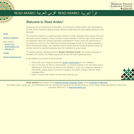
The Read Arabic! Internet lessons were developed at the National Foreign Language Center (NFLC) at the University of Maryland primarily with high school students of Arabic in mind; however, the materials can also be used for those in college at the basic and intermediate level as well. The website assumes knowledge of the Arabic alphabet and how to read. In addition to lessons, the website includes a basic overview of the Arabic language in English, from its history to modern usage, and learning suggestions.
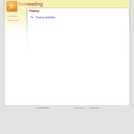
FreeReading is an open source instructional program that helps educators teach early literacy. Because it is open source, it represents the collective wisdom of a wide community of teachers and researchers. FreeReading contains Reading Connect Text Activities, a page of sequential and supplemental activities that helps teachers teach students to decode their first sentences in print.

In A Plaguing Problem, students need to reconstruct lost knowledge about pain relieving drugs. They learn about concepts such as neurotransmission, the neurobiology and history underlying drug addiction, pain management, and analgesia. This game consists of three consecutive episodes with a continuous storyline and we recommend playing the episodes in order.

In Nothing To Rave About, students are asked to uncover why there has been a dramatic increase in the number of teens admitted to the emergency room after partying at a local dance club. During their investigation, they learn how ecstasy and other club drugs act on the nervous system. This game consists of three consecutive episodes with a continuous storyline and we recommend playing the episodes in order.

In Uncommon Scents, students investigate a chemical accident and learn about the health effects of exposure to toxic chemicals. They will discover that many common household products contain toxic chemicals, learn how inhaling these product can severely damage the nervous system and other parts of the body, and find ways to protect themselves from exposure to toxic vapors. This game consists of three consecutive episodes with a continuous storyline. We recommend playing the episodes in order

Designed for lower elementary, but can be used at any age for a warm up or station activity. Can be done in a regular classroom, physical education class or at home. Great fitness activity done with using only a deck of cards

This H5P drag and drop activity gives you skills practice in creating reference lists and in-text citations using APA 7th edition.
Arrange text boxes in the correct order to complete the in-text citation and reference list entry.
Test yourself, compete with friends, or simply use the information bubbles to learn the basics.

In this collection you will find all the resources shared originally at our Reliable Resources workshop on April 22, 2021. These resources include lesson plans, curriculum, teaching strategies, and games for teachers and students to develop a better understanding of economics and personal finance.

This OER combined lesson plans have been written by Brooke MacKenzie and RJ Avery. The purpose is to institute restorative practices within the classroom, espcially with collaborative group work.

Made by Rhett(RJ) Avery and Brooke Mackenzie.this lesson attempts to convey restorative practices and communication skills to a younger, elementary-grade audience.
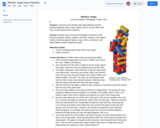
Rhetoric Jenga is an activity that allows students to practice the rhetorical skills needed to reach an audience successfully while also fostering friendly classroom competition. To start, students are split into three large groups that correspond to the colors of a tricolor Jenga tower, while one student is designated as the “player” who will be pulling out pieces of the tower. The goal of the activity is for each team to persuade the player to pull their color first, earning them points; the player gets to decide which color to pull based on the persuasion being used, and thus, points go to the team who most effectively used rhetoric to persuade. Ultimately, this activity helps students develop rhetorical skills and audience awareness. The game challenges students to use only a single rhetorical appeal to reach an audience, but ultimately shows them that utilizing more than one rhetorical appeal is what helps make their arguments even more persuasive, and therefore, more effective.
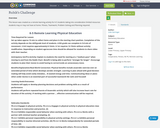
This lesson was created as a remote learning activity for K-5 students taking into consideration limited resources students may or may not have at home. Fitness, Teamwork, Problem Solving and Planning required.

This plan was created by Jean Harper as part of the 2020 ESU-NDE Learning Plan Project. The attached plan is designed for Grade 4 English Language Arts students. Students will evaluate sentences, recongize and correct run-on sentences. This plan addresses the following NDE Standard: NE LA 4.1.6, LA 4.1.6dIt is expected that this plan will take students 60 minutes to complete.

Contains files to print and play SEEK!, a card game to help students improve their information literacy - in particular, the ability to construct a search strategy.
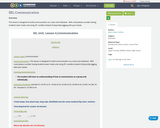
This lesson is designed to build communication as a class and individual. With covid please consider having students wear masks and using 2ft. noodles instead of physically tagging with your hands.
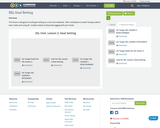
This lesson is designed to build goal setting as a class and individual. With covid please consider having students wear masks and using 2ft. noodles instead of physically tagging with your hands.
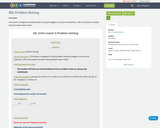
This lesson is designed to build problem solving strategies as a class and individual. With covid please consider having students wear masks.